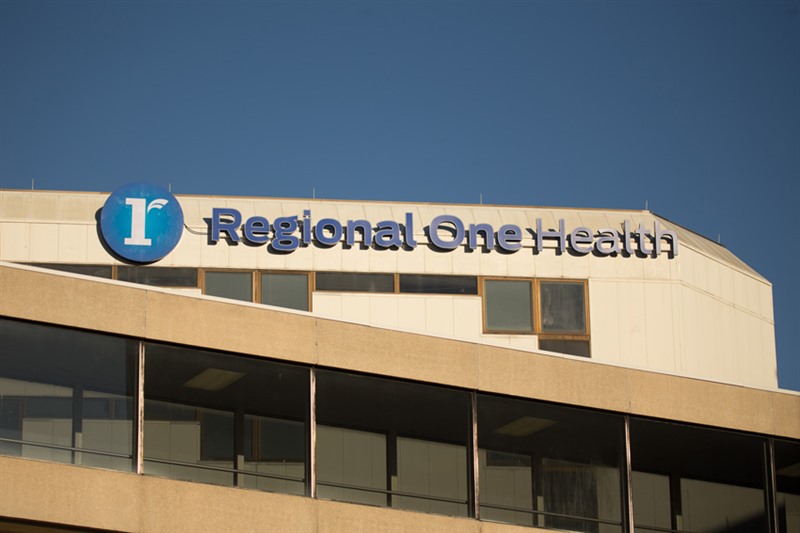In searching for the money to rebuild the Regional One Health complex, Shelby County Government is faced with picking the best option from a list of bad ones.
As is often the case in local government in Tennessee, it means trying to decide which of the choices is the least regressive in a state with the most regressive tax structure in the U.S. It not only favors wealthier families, but in doing it, it deepens income inequality.
Its inherit unfairness leaves Shelby County Government with making an unenviable choice – which regressive tax to pick to pay for the bonds for a new hospital and schools – sales tax, wheel tax, or property tax.
Thanks to former Tennessee State Senator Brian Kelsey, Tennessee’s regressive test structure is destined to remain that way. He introduced a bill that resulted in a state constitutional amendment banning the possibility of an income tax in Tennessee at any time in the future. It was part of his narcissistic effort to remake Tennessee in his image as he proposed more amendments to the Tennessee Constitution than any legislator in history.
Ingraining the Unfairness
But that said, Amendment 3 was bad governance in the extreme. It forbids an income tax option for future Tennesseans interested in creating a fairer tax system, it ensures that local government will continue to rob Peter to pay Paul, and it enshrines one of the nation’s most regressive tax systems as a Tennessee birthright.
Mr. Kelsey’s ban in 2014 was passed 2-1 in a vote by the public which never grasped the positive impacts of a progressive tax source that was serving 41 other states and how it is the absence of a progressive tax structure that has led to trade-offs that produce one of the highest sales tax rates in the country and an array of user fees.
The regressiveness at the heart of the system also significantly contributes to the structural budgetary imbalance in Memphis and Shelby County Governments.
It is an imbalance exacerbated by the generous tax breaks given to larger companies and real estate developers – totaling about $1.3 billion in the 18 years I’ve written this blog – and which intensify the pressure on city and county budgets, which makes it even more remarkable that reform of the PILOT program never gets discussed in city and county government budget hearings.
Wheel Tax Rolls On
Shelby County Government deserves credit for its commitment to its public hospital. Many cities and counties have stepped away from their obligations, and while county government has had justification several times to join them, it has remained resolute in its support. This has included yearly funding of about $30 million and issuing bonds for capital improvements.
In fact, the wheel tax – the most misunderstood tax in county history – was created in part to pay for bonds for the hospital. But never in history has county government grappled with a need that is as great or as necessary as today.
The present challenge is to develop a funding plan to produce $350 million as the first money in for what could be a $800 million rebuilding of Regional One Health. It is the most expensive project ever undertaken by Shelby County Government, and the initial amount also is expected to include the money for new high schools in Frayser and Cordova.
Mayor Lee Harris’ preference for a doubling of the much-loathed wheel tax to $100 per vehicle lacked enough support for passage. Attention has now turned to a property tax increase although new life has been breathed into the wheel tax as part of a compromise funding plan.
Mr. Harris’ inclination to see the wheel tax as the answer to county government’s budgetary challenges has always bumped headlong into the political baggage attached to it and the mythology that surrounds it.
I won’t get into the misinformation about the wheel tax here but some of it is addressed in the blog post linked below. Whether the public is right or not, well-informed or ill-informed becomes irrelevant. The myths are too engrained into the political landscape for there not to be howls of protest each time an increase is advanced.
June 5, 2020: The Myths That Won’t Die: Shelby County Wheel Tax
Our community’s support for a public hospital dates to 1829 when Memphis General Hospital opened. It was owned by State of Tennessee and was a military hospital during the Civil War, and afterwards, it was given to the City of Memphis and renamed “City Hospital.”
After the turn of the century, wealthy businessman John Gaston bequeathed much of his fortune and his mansion for a public hospital that would bear his name. It opened in 1936, and over the decades, a renowned newborn center was added along with a trauma center, burn center, and a wound center.
Somewhere along the way, its public funding shifted from City of Memphis to Shelby County. 1983, John Gaston Hospital was renamed the Regional Medical Center (The Med) and in 1990 the old John Gaston Hospital was demolished to make way for an improved Med. In 2014, it was renamed again, becoming Regional One Health.
The hospital has shed much of its “poor people’s hospital” image under the leadership of Regional One Health President and CEO Dr. Reginald Coopwood. Confidence in his vision for the hospital, supported by the significant strides it has made during his 13 years as its leader, is a major driver of county support for a new hospital.
Mixing and Matching
None of this means that once the wheel tax went down in flames a few days ago that a less regressive funding suddenly opened up. Attention turned to the property tax, another regressive tax, but at least, as opposed to the wheel tax, it is deductible from federal income tax returns.
It seems strange that rather than the all or nothing approach to finding one tax to fund the county’s $350 million bond issue, it has not consider a mix and match approach, combining something from several tax sources.
For example, what about a plan that included a $25 increase in the wheel tax, a .5% increase in the local option sales tax to 2.75%, a reduction of maximum PILOT tax breaks from 75% to 60%, and a 15-cent increase in property taxes. Such an approach would set up county government in a financial foundation that would satisfy its needs for a decade.
Perhaps, such an approach exceeds the courage of county officials, fearing that the public would feel like they are getting hit with tax increases from all sides.
Unfair at its Core
However, back to the main point, the essence of the problem is that Tennessee has one of the most regressive tax structures in the country. According to a study by economists at the Federal Reserve, “A switch to the Tennessee tax code (across the U.S.) would serve to increase after-tax inequality substantially.”
Or said a different way, with no income tax and with high sales taxes, Tennessee is asking poor people to pay far more than their fair share. Or as the headline about the Fed study in Atlantic magazine stated: “Congratulations Tennessee: You’ve Got The Most Regressive Tax System in America.” That same undesirable tax position was confirmed in studies by the Tennessee Advisory Committee on Intergovernmental Relations and the District of Columbia Office of Chief Financial Officer.
A regressive tax is one that is uniformly applied to all taxpayers, which in reality means low-income workers pay a larger share of their incomes than middle or high-income workers. The higher the income, the lower the tax burden. In this way, it not only requires lower income workers to pay a disproportionate share of the tax burden but at the same time, this structure makes inequality worse.
Tennessee has taken this approach to the breaking point. It not only does not have an income tax but it relies most heavily on sales taxes and fees to produce its revenues than most states.
With the Republican supermajority in the Tennessee Legislature, this upside down tax structure has grown even more unfair as higher income families receive tax breaks and even the end of some longstanding taxes on investments and dividends.
According to the study by the Fed, it doesn’t have to be this way. Some states have created tax codes with the purpose of mitigating income inequality. For example, the Fed concluded that if all states switched to the Minnesota tax code, after-tax wage inequality would fall.
It’s no wonder states like ours often find themselves at the bottom of the rankings for the things that drive economic growth like quality of life and education largely because it does not have enough revenues to make the kinds of investments that produce the most important return on investments (think public transit).
Tale of the Tape
The evidence that Tennessee’s tax structure is one of the most regressive in the U.S. is clear and damning. The lower the earnings of a Tennessee family, the greater percentage it pays for its tax burden.
If a family earns $25,000 a year, its tax burden is 18% of its income.
If a family earns $50,000 a year, its tax burden is 7.4% of its income.
If a family earns $75,000 a year, its tax burden is 6.4% of its income.
If a family earns $100,000 a year, its tax burden is 5.9% of its income.
If a family earns $150,000 a year, its tax burden is 5.1% of its income.
There’s no more graphic example of a regressive tax structure than this, and it is in large measure why legislative bodies like the Shelby County Board of Commissioners face such difficulty in finding how to fund vital services that are the threads that hold together the lives of so many of our people.
There’s little hope that this legislature with its extreme rightward slant will come to the aid of local governments forced by state law to punish its families earning the least with the tax burden that’s the greatest. The dismal reality is that the Legislature – which governs by grievances and talking points – is more likely to approve more gifts to wealthier Tennesseeans in the form of tax breaks in the future.
The grassroots movement that is needed for change is mitigated by the public’s general lack of understanding that their state’s tax structure is unfair at its core and how the Legislature’;s supermajority treats so many Tennesseeans’ lives as immaterial as they reach decisions in Nashville.
***
Join us at the Smart City Memphis Facebook page and on Instagram for daily articles, reports, and commentaries that are relevant to Memphis.




